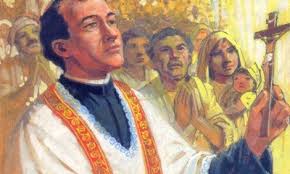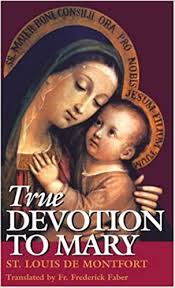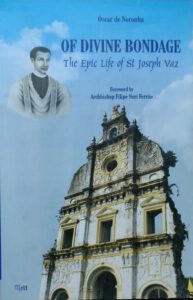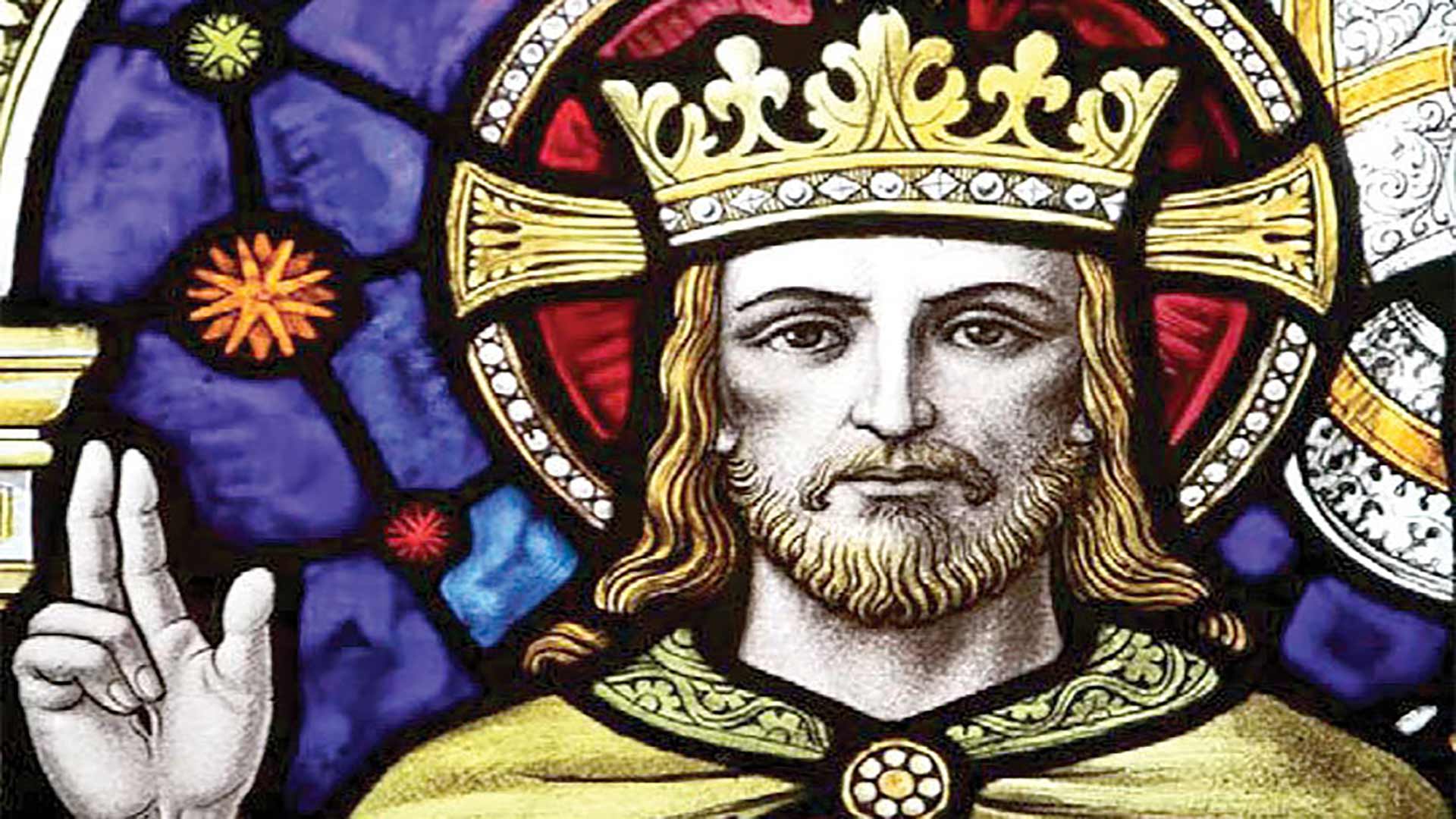The Universal King of Hearts
The liturgical year celebrates the Mystery of Christ, right from His Incarnation and Birth to His Ascension, and from Pentecost to the Second Coming of Christ in Judgment. This latter occasion is held today as a Solemnity, which is the highest rank of celebration. Hence the lectionary entry for today, the thirty-fourth or last Sunday of the Year, reads: ‘Solemnity of Our Lord Jesus Christ Universal King’.
Describing Our Lord as King should not raise eyebrows. Did He not belong to the Royal House of David? Didn't the Wise Men at His Birth and Pilate at His trial and crucifixion refer to Him as ‘King of the Jews’? Most important of all, the Scriptures awaited a Messiah who would be Prophet, Priest and King. It is quite another matter that the high priest Caiphas twisted all that to mean that Jesus was subverting the Roman imperial authority in an attempt to become king. He knew full well that Jesus would be put to death for sedition. As for Pilate, however, he found no basis for a charge against Jesus; yet he let the populace execute their desire to kill Him. It is very significant that eventually Rome became the headquarters of Christianity!
Pilate did not find a basis for a charge because Jesus had convincingly said, ‘My kingdom is not of this world.’ Jesus was no doubt a king, but not of this world. The House of David was where he belonged as man but as God He was not to be seduced by it. In fact, Rome did not have to fear Him as a political rival, for He functioned in the spiritual realm. He was not in need of any human defence either, for He was one with the Father in Heaven. Whereas the Sanhedrin had expressly made Jesus' claim to divinity look like blasphemy, He was soon vindicated by His Resurrection and Ascension.
Today’s Readings trace the story of spiritual royalty. The First Reading (Dan 7: 13-14) is apocalyptic in nature and focussed on ‘one like a son of man’. While in the Old Testament, this term refers to one man or to humankind, Daniel is the only one who uses it differently. In the Babylonian exile, he had a vision of four great beasts set to overpower the earth. The Ancient of Days (God the Father) took his seat of judgment and expelled them. Daniel then saw ‘one like a son of man, coming with the clouds of heaven’ and standing before the Father, who gave him authority over all nations, languages, and peoples of the world for all eternity.
As for the Jews of Jesus’ time, they took the ‘son of man’ (Dan 7) to be a messianic human figure who would liberate them from political subjugation and restore the House of David. Jesus, on the other hand, was divine and unconcerned about earthly politics, as is evident from today’s Gospel text (Jn 18: 33-37). Perhaps only the religious, intellectual and political leaders were in the know of the real identity of Jesus. But then, instead of clarifying those popular misconceptions, they suitably exploited them with a view to safeguarding their own exalted positions.
It became necessary for Jesus to die and rise and fulfil all the other prophecies about the Son of Man for the world to know the full truth. Many New Testament passages (e.g. Mt 26: 64 and Mk 16: 26) are evocative of the imagery from Daniel’s vision. So, now there can be no doubt that Jesus was that Son of Man. He came into the world not to restore material goods but spiritual goods; to destroy not political powers but the power of sin. His Passion and Death revealed the love of God for humankind. At His Second Coming, He will judge the righteous and the unrighteous, and the former will inherit the kingdom of God.
The Second Reading (Rev 1: 5-8) gives us that hope. The Book of Revelation was written during the reign of Emperor Domitian, one of the great persecutors of the Church. The author, St John, sought to convey a sense of optimism and confidence in face of the people's suffering. He gives glory and praise to Jesus Christ, as being ‘the faithful witness, the first begotten of the dead, and the prince of the kings of the earth, who hath loved us, and washed us from our sins in His own blood, and hath made us a kingdom, and priests to God and His Father.’ Thanks to Him, one day, sin will disappear from the face of the earth. And when that day comes, we as followers of Christ will share in His glory and enjoy His loving, peaceful kingship for ever.
We must all pray for the kingdom to come, as indeed we do in the Our Father. However, a sine qua non for the kingdom to come is to let God's will be done. For this, we must let go of ourselves and make God the be-all and end-all of our life. Humanly speaking, this is not easy; but with God’s help nothing is impossible. We must, then, learn to put God first in everything we do, in every step we take, big or small. Our ardent desire must be translated into concrete decisions. This calls for prayer, sacrifice and practice of the Sacraments. It also calls for evangelisation by word and deed.
In short, we must ardently desire that more and more people join us in the campaign to let God’s kingdom come and His will be done. This sentiment is best conveyed by St Louis de Montfort’s stirring hymn ‘We Want God’. In a world steeped in atheism, agnosticism and indifferentism, we must take a stand for God. By having Christ as the king of our hearts we will have Him as the King of the Universe. He will forever be the Universal King of Hearts.
Vaz, Montfort and their self-consecrations
Marian dedication stands enriched by the singular contributions made by Joseph Vaz (Goa, 1651 – Sri Lanka, 1711) and Louis de Montfort (France, 1673 – France, 1716).
Vazian Formula
Joseph Vaz expressed his profound love and tender care to the sublime Queen of the Universe and Mother of Fair Love in a memorable document known as the “Deed of Bondage”,[1] which reads as follows:
Be it known to all who see this deed of bondage, the angels, men, and all creatures, that I, Father Joseph Vaz, sell and offer myself as a perpetual slave of the Virgin Mother of God, through a free, spontaneous and perfect gift that in law is said to be irrevocable inter vivos; I give myself and my assets that she, as my true Lady, may dispose of me and of them according to her will; and as I consider myself unworthy of such an honour, I beseech my Guardian Angel and the glorious Patriarch St Joseph, most beloved Spouse of this Sovereign Lady and saint of my name, and other citizens of heaven, to ensure that she includes me in the number of Her slaves. In witness thereof I seal this with my name, and would have liked to seal it with the blood of my heart. Written at the Church of Sancoale, at the foot of the altar of the same Virgin Mary Mother of God, Our Lady of Health, this fifth day of August, Feast of Our Lady of the Snows, one thousand six hundred and seventy-seven. – Joseph Vaz.[2]

In Goa, the consecration has been traditionally looked at as something peculiar to St Joseph Vaz. The original “Deed” is not traceable, but Joseph Vaz’s first published biographer, the Oratorian priest Sebastião do Rego (1699-?), vouches that he read and kissed it several times, in the hope that he would be touched by a spark of the great fire with which it was written.[3] Did the Saint leave the manuscript behind with the Congregation, or with his family, in Goa? Might he have carried it with him to Sri Lanka? Hopefully, it will one day be found among the Oratorian documents.
What might have inspired Joseph Vaz to commit himself thus to our Divine Mother? Was it the influence of a teacher, from among the Jesuits, or more likely from among the Dominicans, who are known to have been great Marian devotees? Did Joseph find motivation in the books of spirituality that he came across in the rich seminary libraries? Further, why did he take the Feast of Our Lady of the Snows for a red-letter day in his life? Was it the fact that she is the patroness of Rome’s most important Marian church popularly called Santa Maria Maggiore?
While answers to those questions may remain conjectural, one thing is sure: what the Apostle of Sri Lanka has bequeathed to humankind is a precious document with a tenor both mystical and direct; it is “a unique deed inter vivos, in which Fr. Joseph Vaz is at once the donor and donation, notary and clerk; and the Blessed Virgin, donee and witness, while the Patriarch St Joseph, Spouse of the Donee and his namesake, his guardian angel and the other citizens of heaven are constituted intercessors before the Donee”.[4] Joseph Vaz is ready, Christ-like, to shed blood in atonement. And far from alienating the reader, the legalese underscores the solemnity of the act.
Montfortian Formula
Coming to Montfort’s act of consecration: it is the grand finale to his Treatise on the True Devotion to the Blessed Virgin.[5] His formula, thrice as long as Vaz’s, reads as follows:

O Eternal and Incarnate Wisdom! O sweetest and most adorable Jesus! True God and true man, only Son of the Eternal Father, and of Mary, always virgin! I adore Thee profoundly in the bosom and splendours of Thy Father during eternity; and I adore Thee also in the virginal bosom of Mary, Thy most worthy Mother, in the time of Thine incarnation.
I give Thee thanks for that Thou hast annihilated Thyself, taking the form of a slave in order to rescue me from the cruel slavery of the devil. I praise and glorify Thee for that Thou hast been pleased to submit Thyself to Mary, Thy holy Mother, in all things, in order to make me Thy faithful slave through her. But, alas! Ungrateful and faithless as I have been, I have not kept the promises which I made so solemnly to Thee in my Baptism; I have not fulfilled my obligations; I do not deserve to be called Thy child, nor yet Thy slave; and as there is nothing in me which does not merit Thine anger and Thy repulse, I dare not come by myself before Thy most holy and august Majesty. It is on this account that I have recourse to the intercession of Thy most holy Mother, whom Thou hast given me for a mediatrix with Thee. It is through her that I hope to obtain of Thee contrition, the pardon of my sins, and the acquisition and preservation of wisdom.
Hail, then, O immaculate Mary, living tabernacle of the Divinity, where the Eternal Wisdom willed to be hidden and to be adored by angels and by men! Hail, O Queen of Heaven and earth, to whose empire everything is subject which is under God. Hail, O sure refuge of sinners, whose mercy fails no one. Hear the desires which I have of the Divine Wisdom; and for that end receive the vows and offerings which in my lowliness I present to thee.
I, N_____, a faithless sinner, renew and ratify today in thy hands the vows of my Baptism; I renounce forever Satan, his pomps and works; and I give myself entirely to Jesus Christ, the Incarnate Wisdom, to carry my cross after Him all the days of my life, and to be more faithful to Him than I have ever been before. In the presence of all the heavenly court I choose thee this day for my Mother and Mistress. I deliver and consecrate to thee, as thy slave, my body and soul, my goods, both interior and exterior, and even the value of all my good actions, past, present and future; leaving to thee the entire and full right of disposing of me, and all that belongs to me, without exception, according to thy good pleasure, for the greater glory of God in time and in eternity.
Receive, O benignant Virgin, this little offering of my slavery, in honour of, and in union with, that subjection which the Eternal Wisdom deigned to have to thy maternity; in homage to the power which both of you have over this poor sinner, and in thanksgiving for the privileges with which the Holy Trinity has favoured thee. I declare that I wish henceforth, as thy true slave, to seek thy honour and to obey thee in all things.
O admirable Mother, present me to thy dear Son as His eternal slave, so that as He has redeemed me by thee, by thee He may receive me! O Mother of mercy, grant me the grace to obtain the true Wisdom of God; and for that end receive me among those whom thou lovest and teachest, whom thou leadest, nourishest and protectest as thy children and thy slaves.
O faithful Virgin, make me in all things so perfect a disciple, imitator and slave of the Incarnate Wisdom, Jesus Christ thy Son, that I may attain, by thine intercession and by thine example, to the fullness of His age on earth and of His glory in Heaven. Amen.

Montfort’s formula begins with an invocation of the Incarnate God. The Christological opening is quickly followed by Marian veneration, in acknowledgment of the Incarnation. Our Lord’s death on the Cross is an act of incomparable nobility, yearning as He did to rescue humanity through His sacrifice; our inspired author stresses that He emptied himself, taking the form of a slave (Phil. 2:7). A self-imposed slavery like this can only be termed a slavery of love.
Montfort points to a divine enslavement that is liberating, as opposed to human liberty that can be enslaving. And what can be better than following Jesus’ example of submitting Himself to His holy Mother? At the heart of the Montfortian formula is the recognition of human unworthiness to stand in the presence of our Lord and God, other than through His Mother’s intercession. The point of resolution comes with the renewal of the baptismal vows; an express renunciation of Satan; and decision to follow Jesus and be faithful to Him.
Appraisal
The two consecration formulas are essentially the same: note the similarity of the terms employed. In addition, Vaz sells himself as a slave while offering himself as a “gift in perpetuity”; he humbly calls upon the angels, men and creatures, to mediate, for is it not perfectly justified to take one’s Guardian Angel into confidence; to appeal to the saint of one’s name; and, as per the communion of saints, invoke their intercession before her.

Vaz’s act is crisp and intimate; Montfort’s, uninhibited and elaborate. St Joseph Vaz’s singular self-offering happened when he was 26 years of age; it is not known when St Louis de Montfort made his, but he included a very brief formula of consecration at the end of his Love of Eternal Wisdom (c. 1703), when he was 30. Vaz embraced the spirituality of St Philip Neri eight years after his consecration; Montfort became a Dominican tertiary in 1710, three years before his Treatise.
Finally, Fr. Joseph Vaz is not known to have ever spoken publicly about his “Deed”, so it may be regarded as a very personal statement. It was for sure a product of his deep conviction; none before him are known to have embraced the slavery of love in Goa,[6] and none from among his confreres are known to have followed his example. On the other hand, not only is Montfort’s Treatise highly elucidative, his consecration formula is an expansive public declaration of what every Catholic ought to strive for; it is a standing invitation to build a profound and intimate union with Christ through Mary.
(Excerpted from my article titled “Two Saints and a Consecration for our Times”, in St Joseph Vaz for All Times, edited by Fr. Aleixo Menezes and published by the Archdiocese of Goa and Daman, 2015, and posted here with minor alterations)
[1] This is sometimes referred to as a “Letter”, in a literal translation of the Portuguese “Carta do Cativeiro”. Whereas “Cativeiro” could be variably translated as captivity, bondage, or slavery; “Carta” would be better translated as “Deed”, and not simply as “Letter”, particularly considering the legal language in which it is couched.
[2] Translated by this author. Cf. Óscar DE NORONHA, Of Divine Bondage: The Epic Life of St Joseph Vaz, (Third Millennium: Panjim, 2014), 25
[3] Sebastião DO REGO, Vida do Venerável Padre José Vaz (Imprensa Nacional: Goa, 19623), 172.
[4] Seráfico MISQUITA, Ven. Padre José Vaz, Apóstolo de Ceilão (Tipografia Rangel: Goa, 1969), 30.
[5] St Louis DE MONTFORT, True Devotion to Mary. Transl. Frederick William Faber. Revised edition. (Montfort Publications: New York, 1967), 227-229.
[6] St Louis de Montfort himself has said that although the true devotion is an easy way, few saints have entered upon it. Cf. James Patrick GAFFNEY, ed., Jesus Living in Mary, op. cit., 231.

